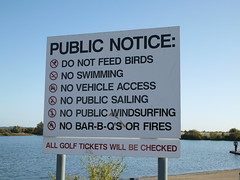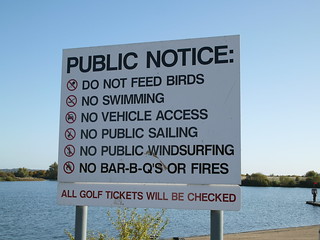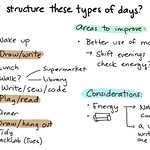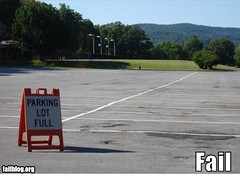The wiki train timetable
 Imagine a train timetable catalogue created along the same lines as Wikipedia. This is how it might work.
Imagine a train timetable catalogue created along the same lines as Wikipedia. This is how it might work.7 questions to ask regarding whether education technology improves learning
 Does education technology improve learning? The intuitive answer to those of us involved in education technology is “of course it does”. However, the evidence from research is not conclusive. I think the reason is that it’s actually very difficult to carry out robust research in this area. As the impact of education technology has often been a topic for discussion in the Naace and Mirandanet mailing lists, I thought it might be useful to try and clarify the issues as I see them.
Does education technology improve learning? The intuitive answer to those of us involved in education technology is “of course it does”. However, the evidence from research is not conclusive. I think the reason is that it’s actually very difficult to carry out robust research in this area. As the impact of education technology has often been a topic for discussion in the Naace and Mirandanet mailing lists, I thought it might be useful to try and clarify the issues as I see them.7 reasons not to swear in blogs
 It seems to be depressingly more and more likely to find that a blog article which looks promising is peppered with swear words – or one particular swear word that is repeated ad nauseum. I think that writers of such blog posts are making a grave error. Here are my reasons.
It seems to be depressingly more and more likely to find that a blog article which looks promising is peppered with swear words – or one particular swear word that is repeated ad nauseum. I think that writers of such blog posts are making a grave error. Here are my reasons.A too-robust approach to spam
 I was reading recently that something like 47% of emails are spam. I can believe it. I get the whole range: offers of Russian brides, Viagra, genie bras, news that a previously unknown relative has left me tons of money and messages exhorting me to open the attached document or confirm my security details. All this would be quite funny on one level, but it makes downloading and then sifting through email that much more difficult.
I was reading recently that something like 47% of emails are spam. I can believe it. I get the whole range: offers of Russian brides, Viagra, genie bras, news that a previously unknown relative has left me tons of money and messages exhorting me to open the attached document or confirm my security details. All this would be quite funny on one level, but it makes downloading and then sifting through email that much more difficult.
So I decided to do something about it.
Flash fiction and computing
 I’ve been trawling through the archives, and came across the following article. If you missed it the first time around, here’s a chance to read it. If you read it when it was first published, well here’s your chance to enjoy it again!
I’ve been trawling through the archives, and came across the following article. If you missed it the first time around, here’s a chance to read it. If you read it when it was first published, well here’s your chance to enjoy it again!
It’s about flash fiction, and how it can help teach ICT – don’t be put off by the old-fashioned terminology: it all still applies to the new computing curriculum.
7 Expectations for Computing lessons
 I don’t think rules, as commonly formulated, are very useful in the context of Computing lessons. Rules are usually framed in the negative. For example, in a computer lab I went into a few years ago on one of my school visits, there was a poster on the door listing all the things that people shouldn’t do:
I don’t think rules, as commonly formulated, are very useful in the context of Computing lessons. Rules are usually framed in the negative. For example, in a computer lab I went into a few years ago on one of my school visits, there was a poster on the door listing all the things that people shouldn’t do:
Do not leave the computers on.
Do not leave printing next to the computers.
Do not just switch the computers off.
and so on.
There are two main problems with this sort of thing.
6 routines for Computing lessons
 I mentioned recently that in his book The Craft of the Classroom)
I mentioned recently that in his book The Craft of the Classroom)Review of the Association for Information Technology in Teacher Education (ITTE) Conference
 ITTE held its annual conference recently, and I bought a ticket and went along. As far as the ITTE conference is concerned, I was a newbie, and so I wasn’t sure what to expect. I do recall dragging my carcass to the local station in sweltering heat, mumbling to myself something along the lines of “Please let the trains be cancelled; I’d rather be in the garden.” Well, that proved too much for Transport for London to arrange, and so I made it to the conference.
ITTE held its annual conference recently, and I bought a ticket and went along. As far as the ITTE conference is concerned, I was a newbie, and so I wasn’t sure what to expect. I do recall dragging my carcass to the local station in sweltering heat, mumbling to myself something along the lines of “Please let the trains be cancelled; I’d rather be in the garden.” Well, that proved too much for Transport for London to arrange, and so I made it to the conference.Digital Education ezine July edition now available!
 I don’t know what the opposite of “bumper” is (as in “stupendous, 200 page bumper edition”), but the latest issue of Digital Education is small – but perfectly formed. Here’s what it contains:
I don’t know what the opposite of “bumper” is (as in “stupendous, 200 page bumper edition”), but the latest issue of Digital Education is small – but perfectly formed. Here’s what it contains:7 reasons that the FAIL acronym fails
 It is fashionable these days to avoid the ‘F’ word – by which, of course, I mean “Fail”. This is not confined to the area of teaching Computing, but enough people in this field have written about it to nudge me into writing my thoughts on the matter. So, the FAIL acronym, in case you haven’t come across it, is First Attempt In Learning. The idea of it is that instead of telling kids that they have failed at something, you tell that they have not failed. They may have not succeeded, but that is fine, because it was a First Attempt In Learning. Well, I have always been a believer in telling it how it is, and so for me the FAIL acronym does not benefit kids at all. Quite the opposite in fact. Here are my objections:
It is fashionable these days to avoid the ‘F’ word – by which, of course, I mean “Fail”. This is not confined to the area of teaching Computing, but enough people in this field have written about it to nudge me into writing my thoughts on the matter. So, the FAIL acronym, in case you haven’t come across it, is First Attempt In Learning. The idea of it is that instead of telling kids that they have failed at something, you tell that they have not failed. They may have not succeeded, but that is fine, because it was a First Attempt In Learning. Well, I have always been a believer in telling it how it is, and so for me the FAIL acronym does not benefit kids at all. Quite the opposite in fact. Here are my objections: